| Listing 1 - 10 of 19 | << page >> |
Sort by
|
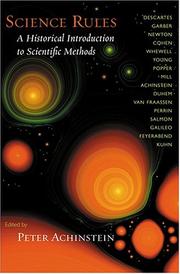
ISBN: 0801879442 0801879434 9780801879432 9780801879449 Year: 2004 Publisher: Baltimore (Md.) : Johns Hopkins university press,
Abstract | Keywords | Export | Availability | Bookmark
 Loading...
Loading...Choose an application
- Reference Manager
- EndNote
- RefWorks (Direct export to RefWorks)
Is there a universal set of rules for discovering and testing scientific hypotheses? Since the birth of modern science, philosophers, scientists, and other thinkers have wrestled with this fundamental question of scientific practice. Efforts to devise rigorous methods for obtaining scientific knowledge include the twenty-one rules Descartes proposed in his Rules for the Direction of the Mind and the four rules of reasoning that begin the third book of Newton's Principia, and continue today in debates over the very possibility of such rules. Bringing together key primary sources spanning almost four centuries, Science Rules introduces readers to scientific methods that have played a prominent role in the history of scientific practice. Editor Peter Achinstein includes works by scientists and philosophers of science to offer a new perspective on the nature of scientific reasoning. For each of the methods discussed, he presents the original formulation of the method; selections written by a proponent of the method together with an application to a particular scientific example; and a critical analysis of the method that draws on historical and contemporary sources. The methods included in this volume are Cartesian rationalism with an application to Descartes' laws of motion; Newton's inductivism and the law of gravity; two versions of hypothetico-deductivism--those of William Whewell and Karl Popper--and the nineteenth-century wave theory of light; Paul Feyerabend's principle of proliferation and Thomas Kuhn's views on scientific values, both of which deny that there are universal rules of method, with an application to Galileo's tower argument. Included also is a famous nineteenth-century debate about scientific reasoning between the hypothetico-deductivist William Whewell and the inductivist John Stuart Mill; and an account of the realism-antirealism dispute about unobservables in science, with a consideration of Perrin's argument for the existence of molecules in the early twentieth century.
Science --- Methodology --- History. --- History --- Science - Methodology - History
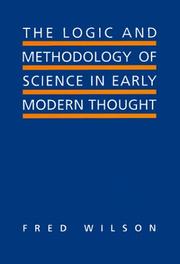
ISBN: 1282028618 9786612028618 1442681659 0802043569 9781442681651 9780802043566 Year: 1999 Publisher: Toronto
Abstract | Keywords | Export | Availability | Bookmark
 Loading...
Loading...Choose an application
- Reference Manager
- EndNote
- RefWorks (Direct export to RefWorks)
"During the seventeenth and eighteenth centuries, Aristotelian notions of logic and causation came under serious attack. Traditional philosophy speaks of this period as marking a revolution in scientific thought. In this book Fred Wilson reinstates and extends the traditional conception of the scientific revolution and its significance, and explores the goals and directions of the new science according to the differing interpretations of rationalist and empiricist thinkers."--BOOK JACKET.
Science --- Philosophy --- History --- Methodology --- Natural science --- Science of science --- Sciences --- Natural sciences --- Science - Philosophy - History - 17th century. --- Science - Methodology - History - 17th century.
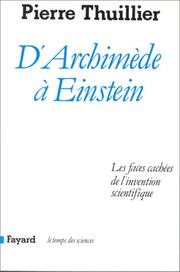
ISBN: 2213021589 9782213021584 Year: 1988 Publisher: Paris Fayard
Abstract | Keywords | Export | Availability | Bookmark
 Loading...
Loading...Choose an application
- Reference Manager
- EndNote
- RefWorks (Direct export to RefWorks)
Philosophy of science --- Research --- Science --- Recherche --- Sciences --- Philosophy --- History --- Philosophie --- Histoire --- Methodology --- -Science --- -Natural science --- Science of science --- -History --- -Methodology --- Natural science --- Methodology&delete& --- Natural sciences --- Science - Methodology - History --- Science - History
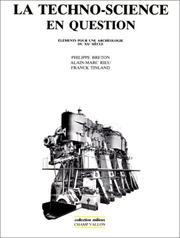
ISSN: 02917157 ISBN: 2876730812 9782876730816 Year: 1990 Volume: *10 Publisher: Seyssel: Champ Vallon,
Abstract | Keywords | Export | Availability | Bookmark
 Loading...
Loading...Choose an application
- Reference Manager
- EndNote
- RefWorks (Direct export to RefWorks)
Philosophy of science --- anno 1900-1999 --- Science --- Technology and civilization --- Sciences --- Technologie et civilisation --- Methodology --- History --- Méthodologie --- Histoire --- Méthodologie --- Science - Methodology - History --- Sciences et civilisation --- Technologie de pointe --- Technique et civilisation --- Technique --- Aspect social --- 20e siècle
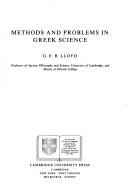
ISBN: 0521374197 9780521374194 Year: 1991 Publisher: Cambridge Cambridge University press
Abstract | Keywords | Export | Availability | Bookmark
 Loading...
Loading...Choose an application
- Reference Manager
- EndNote
- RefWorks (Direct export to RefWorks)
Pure sciences. Natural sciences (general) --- Antiquity --- Greece --- Science --- Sciences --- Methodology --- History --- Méthodologie --- Histoire --- History. --- -Science --- -Natural science --- Science of science --- -History --- -Methodology --- Méthodologie --- Natural science --- Methodology&delete& --- Natural sciences --- Science - Greece - History. --- Science - Methodology - History.
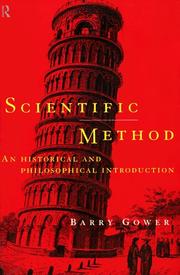
ISBN: 0415122821 9780415122825 Year: 1997 Publisher: London Routledge
Abstract | Keywords | Export | Availability | Bookmark
 Loading...
Loading...Choose an application
- Reference Manager
- EndNote
- RefWorks (Direct export to RefWorks)
The central theme running throughout this outstanding new survey is the nature of the philosophical debate created by modern science’s foundation in experimental and mathematical method. More recently, recognition that reasoning in science is probabilistic generated intense debate about whether and how it should be constrained so as to ensure the practical certainty of the conclusions drawn. These debates brought to light issues of a philosophical nature which form the core of many scientific controversies today. Scientific Method: A Historical and Philosophical Introduction presents these debates through clear and comparative discussion of key figures in the history of science. Key chapters critically discuss *Galileo’s demonstrative method, Bacon’s inductive method, and Newton’s rules of reasoning * the rise of probabilistic `Bayesian’ methods in the eighteenth century * the method of hypotheses through the work of Herschel, Mill and Whewell * the conventionalist views of Poincaré and Duhem * the inductivism of Peirce, Russell and Keynes * Popper’s falsification compared with Reichenbach’s enumerative induction * Carnap’s scientific method as Bayesian reasoning The debates are brought up to date in the final chapters by considering the ways in which ideas about method in the physical and biological sciences have affected thinking about method in the social sciences. This debate is analyzed through the ideas of key theorists such as Kuhn, Lakatos, and Feyerabend.
Science --- Methodology. --- Methodology --- Philosophy. --- History. --- Hulpwetenschappen --- filosofie --- filosofie. --- Filosofie. --- Natural science --- Science of science --- Sciences --- Scientific method --- Logic, Symbolic and mathematical --- Methodology&delete& --- History --- Philosophy --- Natural sciences --- Science - Methodology. --- Science - Methodology - Philosophy. --- Science - Methodology - History.
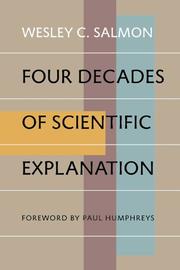
ISBN: 0822959267 0822973022 9780822973027 0816618259 0822959402 9780822959267 Year: 1990 Publisher: Minneapolis (Minn.): University of Minnesota
Abstract | Keywords | Export | Availability | Bookmark
 Loading...
Loading...Choose an application
- Reference Manager
- EndNote
- RefWorks (Direct export to RefWorks)
Provides an account of the developments in scientific explanation that transpired in the last four decades of the twentieth century. This book underscores the need for a consensus of approach and evaluations of methodology in scientific explanation, withthe goal of providing an understanding of natural phenomena.
Science --- Philosophy --- History. --- Methodology --- Natural science --- Natural sciences --- Science of science --- Sciences --- Methodology&delete& --- History --- Philosophy&delete& --- Methodology. --- Philosophy. --- Philosophie --- Histoire. --- Méthodologie --- Scientific method --- Logic, Symbolic and mathematical --- Science - Philosophy - History. --- Science - Methodology - History.
Book
ISBN: 9782271081193 227108119X Year: 2015 Publisher: Paris CNRS éditions
Abstract | Keywords | Export | Availability | Bookmark
 Loading...
Loading...Choose an application
- Reference Manager
- EndNote
- RefWorks (Direct export to RefWorks)
L'article, le graphique, la fiche, le poster, le cahier de laboratoire sont quelques-uns des nombreux outils du travail scientifique étudiés dans cet ouvrage qui offre une histoire matérielle de la culture savante entre le XVIe et le XXIe siècle. Il rend manifeste, de la médecine à l'archéologie, de la géographie à la chirurgie, ce que l'on ne voit pas ou plus dans les résultats : la masse imposante de l'outillage à disposition, sa grande diversité, son accroissement constant. S'y ajoutent les ressources des savants eux-mêmes, celles de leurs sens éduqués ou amplifiés par de multiples instruments. Les configurations fascinantes que ces outils et leur emploi créent entre écrit, image, parole, regard et geste révèlent le caractère composite, multimédia et multisensoriel, de l'ordre raisonné du savoir. Explorer la science dans sa matérialité éclaire d'un jour nouveau des pans entiers de l'histoire intellectuelle. Les outils de travail ne sont pas de simples à-côtés des idées. Ils participent étroitement à la connaissance, entre objectivité scientifique et éléments empruntés à l'expérience des sens.
History of civilization --- Science --- Scientific apparatus and instruments --- Sciences --- Appareils et instruments scientifiques --- Methodology --- History --- Social aspects --- Philosophy --- Méthodologie --- Histoire --- Aspect social --- Philosophie --- Savants --- Travail intellectuel --- Méthodologie --- Social aspects. --- Histoire. --- Science - Methodology - History --- Science - Social aspects --- Scientific apparatus and instruments - History --- Science - Philosophy - History
Book
ISBN: 0801414652 9780801414657 Year: 1984 Volume: 42 Publisher: Ithaca, N.Y. Cornell University Press
Abstract | Keywords | Export | Availability | Bookmark
 Loading...
Loading...Choose an application
- Reference Manager
- EndNote
- RefWorks (Direct export to RefWorks)
Philosophy of science --- Epicurus --- Science --- Methodology --- History --- -Natural science --- Science of science --- Sciences --- -History --- Epikuros --- Ėpikur --- Epiḳoros --- Epicuro --- Epikouros --- Abīqūr --- Yibijiulu --- Epicure --- Epʻikʻurosŭ --- Έπίκουρος --- History. --- -Methodology --- Natural science --- Methodology&delete& --- Epicurus. --- Ἐπίκουρος --- Natural sciences --- Science - Methodology - History --- Epicuriens
Book
ISSN: 12594490 ISBN: 2745314076 9782745314079 Year: 2005 Volume: 7 Publisher: Paris Champion
Abstract | Keywords | Export | Availability | Bookmark
 Loading...
Loading...Choose an application
- Reference Manager
- EndNote
- RefWorks (Direct export to RefWorks)
Constant, Benjamin, --- Criticism and interpretation --- Social and political views --- Politics and literature --- Political science --- Philosophy --- History --- History. --- Methodology --- Historiography. --- Philosophy. --- French literature --- Political philosophy --- 18th-19th centuries --- Criticism --- Constant, Benjamin --- Contributions in political science --- Liberalism --- France --- 19th century --- Politics and government --- Politics and literature - France - History. --- Political science - Methodology - History. --- Philosophy - Historiography. --- History - Philosophy.
| Listing 1 - 10 of 19 | << page >> |
Sort by
|

 Search
Search Feedback
Feedback About UniCat
About UniCat  Help
Help News
News